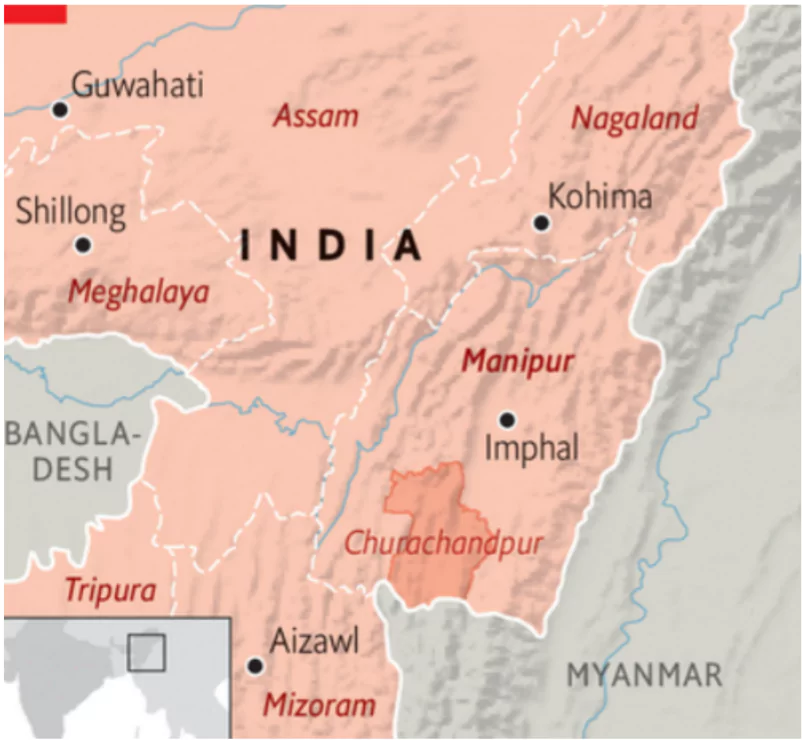The Union Ministry of Home Affairs is reviewing the ground rules applicable to the Kuki-Zo insurgent groups in Manipur.
More About the News

- The Kuki-Zo insurgent groups in Manipur have been in a Suspension of Operation (SoO) agreement with the government since 2008.
- The Union government has proposed the removal of SoO camps from locations close to the valley districts which are dominated by the Meitei people.
- The proposal is a result of the demand of Meitei groups for the removal of the camps from their regions.
- The tripartite pact was abrogated by the Manipur government after it refused to send a representative to a meeting called by the Ministry of Home Affairs, to extend the SoO pact with Kuki-Zo insurgent groups, leaving the agreement in a limbo.
Enroll now for UPSC Online Classes
Historical Background of Kuki Insurgency
- Emergence Alongside Naga Movement: The Kuki insurgency developed in parallel with the Naga movement, both striving for autonomy and the recognition of their unique ethnic identities.
- Escalation During the 1990s: Ethnic clashes between the Kukis and Nagas in Manipur during the early 1990s significantly intensified the Kuki insurgency, which emerged as a reaction to what the Kukis perceived as Naga aggression.
- Colonial Legacy of Hostility: The long-standing animosity between the Kuki and Naga tribes, which dates back to the colonial era, further exacerbated tensions during the Naga-Kuki clashes.
- Kuki Homeland vs. Naga Homeland: The Kukis assert that the hills of Manipur constitute their “homeland,” a claim that conflicts with the Naga aspiration for a Greater Nagaland or Nagalim, which includes the same territory.
- Tengnoupal Massacre: In 1993, the National Socialist Council of Nagaland-Isak-Muivah (NSCN-IM) allegedly killed around 115 Kuki individuals in Tengnoupal. This tragic event is remembered by the Kuki community as the ‘black day.’
About Suspension of Operations (SoO) pact
- Definition: The SoO is a tripartite ceasefire agreement signed by the Centre and Manipur government to start a political dialogue with Kuki insurgent groups in Manipur.
- It was signed in 2008 and 25 out of 30 Kuki insurgent groups in Manipur are under the SoO.
- Historical Context: The agreement was signed in the wake of the Kuki-Naga clashes in the 1990s when hundreds were killed. The insurgent groups demanded an independent land for the Kuki-Zo
- After a peace pact is signed with an insurgent group the militant cadres are to be confined in designated camps identified by the Government.
- Arms are deposited in a safe room under a double-locking system. The groups are given arms only to guard their camps and protect their leaders.
- Current Status: According to an estimate, around 2,200 cadres of the SoO groups live in 14 designated camps in the hill districts of Manipur.
- Agreement Terms: Under this agreement, the insurgent groups agree to halt their operations, including acts of violence, in exchange for certain concessions from the government, such as the establishment of designated camps and the suspension of military operations against them.
Key Terms of the SoO Agreement
- Ceasefire Agreement: Insurgent groups cease all armed activities, while the government halts military operations against them.
- Designated Camps: Insurgents are required to reside in specific, monitored camps to prevent further militant activities.
- Monitoring and Compliance: Compliance is ensured through regular checks by a Joint Monitoring Group, including government and security representatives.
- Disarmament: Insurgents are expected to surrender their weapons as part of the peace process.
- Rehabilitation: As a rehabilitation package, the cadres living in the designated camps are given a monthly stipend of 6000 Rs. Financial assistance is also being provided to maintain the designated camps
- Political Dialogue: The agreement serves as a platform for addressing political grievances through peaceful negotiations.
- Renewal: The agreement is periodically reviewed and renewed, contingent on continued compliance and progress in peace talks.
Check Out UPSC NCERT Textbooks From PW Store
Reasons for the suspension of SoO Agreement
- Criminal Activities: The Manipur government withdrew from the SoO pact due to the involvement of SoO cadres in criminal activities, including incitement and illegal encroachment, thus undermining peace efforts.
- Ethnic Violence: Escalating clashes between the Kuki-Zo and Meitei communities in 2023, highlighted the ineffectiveness of the SoO agreement in maintaining peace
- Central Government Inaction: The central government’s lack of explicit action or communication regarding the extension or abrogation of the SoO pact created uncertainty and doubts about commitment of central government over enforcement of the pact.
- Political Division: Disagreements within the Manipur Assembly over the legality of the SoO agreement further complicated its continuation
![]() 24 Aug 2024
24 Aug 2024

